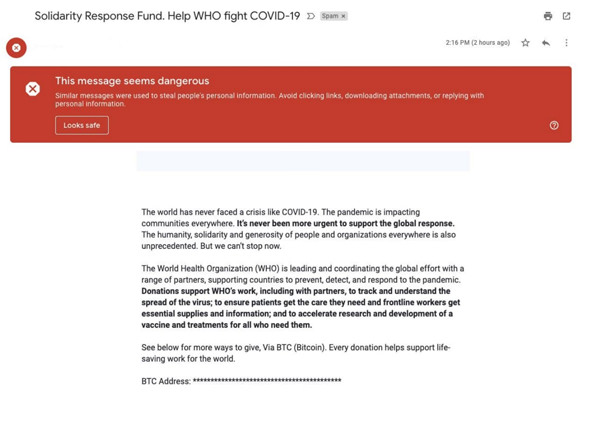Coronavirus: Gmail blocks 18 million phishing scams every day
Phishing activities that exploit the attention to the COVID-19 pandemic and that are blocked by Google’s systems represent 20% of all daily threats.
Google said it was intercepting an impressive amount of emails containing malware and phoning related to coronavirus and the COVID-19 pandemic: 18 million a day, just in the past week.
To put things in proportion, this volume of emails represents about 20% of the more than 100 million phishing messages that Gmail blocks on average every day. And it doesn’t include the 240 million generic spam messages that these systems already filter every day.
We have already talked about the past weeks of the increased cybersecurity risks and how hackers and criminals exploit the emotional reactions that can develop against the situation of social distancing to perpetuate their sinister ends. Google’s findings only confirm the scenario.
The phishing and malware spreading attempts found in this period are nothing new, in most cases, they are already existing campaigns that have been slightly modified to leverage the attention that the public turns towards the COVID pandemic -19.
A key point of Google’s strategy and action is the use of artificial intelligence and machine learning to intercept and recognize this type of email and eliminate them before they arrive in the user’s box. Google had previously disclosed the methods, which are based primarily on its TensorFlow deep-learning models and claiming a 99.9% detection capability.
With 1.5 billion users and 5 million paying business accounts, Gmail is the most-used email service in the world and makes it a good litmus test for the implicit risks associated with a sudden surge in work from home. Google has provided an overview of the messages that machine learning systems try to filter, which in some respects overlaps with the photograph that ESET already outlined a few weeks ago.
Attackers try to impersonate bodies like WHO, try to leverage compassion and ask for bitcoin donations, or government institutions that offer information on how to receive compensation to deal with any liquidity crisis. Or there are still emails sent by a self-styled administration employee who tries to convince the victim to click on dangerous links.
As always, we will never tire of reaffirming the principles that it is good to apply in one’s ” digital life “, even more so in this period: it is important not to let your guard down and follow the ” trust no one ” philosophy, not to trust anyone (even if at this moment, we live the collective need to lean on someone or something). Always be wary, even of what seemingly seems good intentions. Often – almost always – they are not at all.


